Notas de orientación
La pandemia de COVID-19 está afectando no solo al comercio de alimentos, a las cadenas de suministro de alimentos y a los mercados, sino también la vida, los medios de vida y la nutrición de las personas.
Esta colección de notas de orientación sobre políticas presenta una evaluación cualitativa y cuantitativa de los impactos de la pandemia en estas áreas.
La página se actualiza a diario. Vuelva con frecuencia para consultar las últimas notas disponibles.
Para consultas de medios relacionadas con alguno de los temas siguientes contacte con: [email protected]
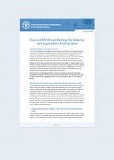
How is COVID-19 affecting the fisheries and aquaculture food systems
10/04/2020
The full range of activities required to deliver fish and fish products from production to the final consumer is subject to indirect impacts of the pandemic through new sanitary measures, changing consumer demands, market access or logistical problems related to transportation and border restrictions. This in turn has a damaging...
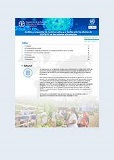
Analysis and responses of Latin America and the Caribbean to the effects of COVID-19 on food system
23/04/2020
This bulletin provides decision-makers in government, the private sector and civil society with useful information and resources to support the design and implementation of actions to combat the effects of the pandemic in Latin America and the Caribbean. The resources and information contained in the bulletin are provided by FAO, as...
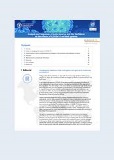
Increasing the resilience of the food system and agricultural livelihoods to COVID-19
29/04/2020
This topic addresses the resilience of agricultural livelihoods and the food system to COVID-19. Lessons learned by those who have had to manage disasters indicate that it is critical to understand, monitor, and anticipate the impacts of crises on agriculture and agricultural livelihoods early on. Timely and accurate monitoring enables...
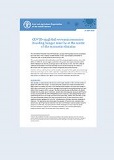
COVID-19 global economic recession: Avoiding hunger must be at the centre of the economic stimulus
06/05/2020
The scenario presented in this brief predicts that if the anticipated global recession, due to the effects of COVID-19, were to trigger a reduction in the growth rate of gross domestic product (GDP) of between two and ten percentage points in all countries in 2020, then the number of undernourished...
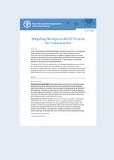
Mitigating the impacts of COVID-19 on the livestock sector
06/05/2020
The COVID-19 pandemic represents an unprecedented emergency and grave societal threat. It is affecting key sectors that contribute to global food security, nutrition and livelihoods, including the livestock sector. This policy brief describes the observed and potential impacts of COVID-19 on the livestock sector, based on evidence from the ongoing...
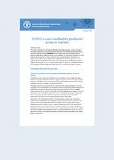
COVID-19 and smallholder producers’ access to markets
06/05/2020
Smallholder producers’ access to markets is also affected by the COVID-19 pandemic. Immediate impacts tend to be more severe for high-value commodities (perishable products), which are often produced by smallholder farmers. Several countries are putting in place a variety of measures to mitigate the impact of the pandemic on smallholder...
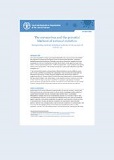
The coronavirus and the potential blackout of national statistics: Reorganizing national statistical systems in the context of COVID-19
06/05/2020
In the context of the COVID-19 pandemic, National Statistical Services at country level remain committed to providing their policymakers, their economy and society with the information they require. In many countries, mitigation and contingency plans are put in place, as the situation evolves. Nevertheless, as the situation continues to deteriorate in...
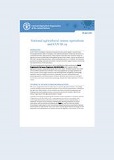
National agricultural census operations and COVID-19
06/05/2020
The COVID-19 pandemic is also affecting agricultural census activities. Currently, 62 countries are preparing (45 countries) or have conducted (17 countries) censuses of agriculture in the WCA 2020 round. A rapid appraisal and informal consultations with national agricultural census authorities reveal that some 34 countries reported delays or suspension of several...
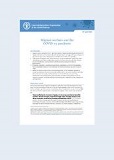
Migrant workers and the COVID-19 pandemic
06/05/2020
The policy brief reviews the impacts of the COVID-19 pandemic on migrants working in agri-food systems and their families in rural areas of origin. It points out some of the policy implications and presents key policy recommendations. Measures affecting the movement of people (internally and internationally) and resulting labour shortages,...

Impact of COVID-19 on informal workers
06/05/2020
The COVID-19 pandemic is a major economic and labour market shock, presenting significant impacts in terms of unemployment and underemployment for informal workers. In rural areas, the livelihoods of especially the self-employed and wage workers are at risk, because agri-food supply chains and markets are being disrupted due to lockdowns...
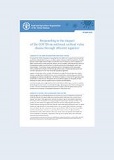
Responding to the impact of the COVID-19 outbreak on food value chains through efficient logistics
06/05/2020
Measures implemented around the world to contain the COVID-19 pandemic have entailed a severe reduction not only in the transportation of goods and services that rely on transport, but also in the migration of labour domestically and internationally. The Food and Agriculture Organization of the United Nations (FAO) urges countries to...
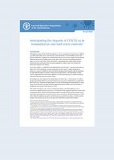
Anticipating the impacts of COVID-19 in humanitarian and food crisis contexts
06/05/2020
While the COVID-19 pandemic is devastating lives, public health systems, livelihoods and economies all over the world, populations living in food crisis contexts are particularly exposed to its effects. Countries with existing humanitarian crises are particularly exposed to the effects of the pandemic. The effects could be even stronger in countries...
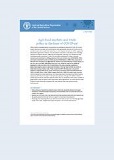
Agri-food markets and trade policy in the time of COVID-19
06/05/2020
The policy brief highlights that policy measures should aim to address actual rather than perceived demand and supply disruptions, and that enhanced market transparency, and coordination with trading partners is critical in this regard. It is noted that experiences from past crises have demonstrated that avoiding certain trade-restrictive measures can...
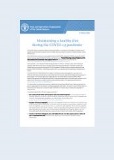
Maintaining a healthy diet during the COVID-19 pandemic
06/05/2020
The COVID-19 pandemic is causing many changes in the daily lives of people around the world, but there are things that can be done to maintain a healthy lifestyle in these difficult times. Everyone is encouraged to follow World Health Organization (WHO) guidance and governmental advice to protect against COVID-19...
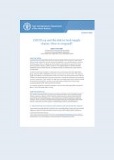
COVID-19 and the risk to food supply chains: How to respond?
06/05/2020
As the COVID-19 pandemic turns into a global crisis, countries are taking measures to contain the pandemic. Supermarket shelves remain stocked for now. But a protracted pandemic crisis could quickly put a strain on the food supply chains, which is a complex web of interactions involving farmers, agricultural inputs, processing plants,...
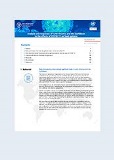
Risks threatening international agrifood trade in Latin America and the Caribbean
07/05/2020
This edition addresses the risks threatening international agrifood trade in Latin America and the Caribbean. In the previous issue we reviewed the lessons learned by those who have had to manage disasters. We presented a methodology for analysing and managing the crisis in food systems from a disaster risk reduction...
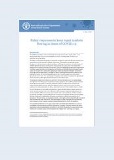
Policy responses to keep input markets flowing in times of COVID-19
11/05/2020
The COVID-19 pandemic poses a substantial risk to agricultural input supply chains. It can detrimentally affect access to and availability of inputs, including seeds, fertilizers and pesticides, as well as labour. As such, disruptions to the supply and demand of inputs will have diverse impacts across and within countries and...
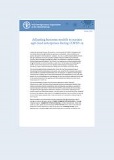
Adjusting business models to sustain agri-food enterprises during COVID-19
11/05/2020
Across the world the COVID-19 crisis is compromising agri-enterprises’ ability to continue business as usual and, in some cases, is threatening the survival of some firms beyond the crisis, particularly small businesses comprised of farm enterprises, traders, food manufacturers, distributors and retailers across food chains. The brief highlights the critical...

Small Island Developing States Response to COVID-19
12/05/2020
The COVID-19 pandemic is threatening the food security, nutrition and climate resilience of Small Island Developing States (SIDS), which share many traits, including a reliance on international trade and imported foods; vulnerability to climate change and malnutrition. This brief highlights some of the identified and potential impacts of the COVID-19...

Mitigating risks to food systems during COVID-19: Reducing food loss and waste
20/05/2020
The COVID-19 pandemic continues to wreak havoc globally, generating significant challenges that could result in risks to food security and nutrition in many countries. Countries are ordering lockdowns, restricting movement and observing physical distancing to curb the pandemic. Disruptions in supply chains resulting from blockages on transport routes, transport restrictions...
